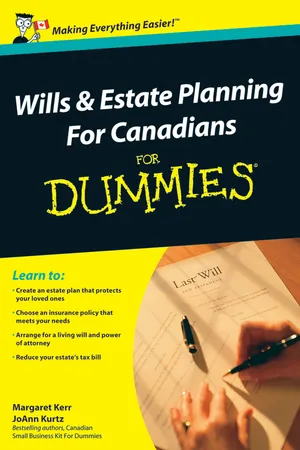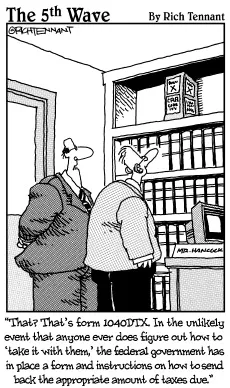
- English
- ePUB (mobile friendly)
- Available on iOS & Android
eBook - ePub
Wills and Estate Planning For Canadians For Dummies
About this book
Wills & Estate Planning For Canadians For Dummies walks you through the steps of planning your estate. This friendly guide will help you
- Reduce the tax you or your estate will pay
- Plan for your children's future
- Leave a charitable legacy
- Decipher the legal lingo in wills
- Prepare a living will to ensure you get the treatment you want
- Hire an estate planning team that will meet your needs
Through practical advice from expert authors, this book helps you ensure that your affairs are in order, and your loved ones will be looked after.
Tools to learn more effectively

Saving Books

Keyword Search

Annotating Text

Listen to it instead
Information
Part I
Estate Planning Basics

In this part . . .
This part gently introduces you to estate planning. We hardly ask you to think about your approaching end at all! Instead we tell you exactly what estate planning is, help you figure out the present size of your estate, and explain how Canadian tax laws affect your estate plan.
Chapter 1
What Is Estate Planning, Anyway?
In This Chapter
Figuring out what it means to have an estate
Knowing what estate planning involves
Exploring why estate planning is essential
Looking at the tools of the estate planning trade
Understanding the right time to prepare an estate plan
Ensuring that you’ll be financially covered in your lifetime too
Taking care of your needs in case you become physically or mentally incapable
Going to the experts
Here’s the good news about estate planning: You have an estate! You don’t have to be a sports star or a computer maven, or to have inherited old family money to have an estate or to need to do estate planning.
Now for the bad news about estate planning: It forces you to think about death — and not just in an abstract philosophical kind of way. It forces you to think about your own death. You may not enjoy the estate planning process very much, but in this chapter we explain why you should do it even though it’s not a lot of fun. We’re going to ease you gently into estate planning. We’ll briefly discuss the main things you need to know, and then in the following chapters we go into more detail.
Understanding What Your Estate Is
We keep talking about this estate of yours, but before you start wondering why the butler and chauffeur didn’t show up for work this morning, we’d better give you a little more detail about what your estate is.
Your estate is made up of everything you own. But in legal terms, your debts — everything you owe — are also part of your estate, because what you own must be used to pay off your debts when you die. (We show you how to take stock of your estate in Chapter 2.)
You need to take some other things into account when you’re estate planning, although they’re not technically part of your estate:
Life insurance: If you have a life insurance policy, when you die either your estate or an individual (or individuals) you name as beneficiary, whichever option you have chosen, will receive the insurance proceeds. (We tell you more about insurance in Chapter 4.)
Pension plans: If you’re a member of an employee pension plan, your spouse or a person you name as beneficiary may be entitled to receive a pension after your death or to receive a one-time payment.
Government benefits: Your spouse and/or children may be entitled to receive either a pension or a one-time payment from the Canada Pension Plan, Old Age Security, Veterans Affairs Canada, or Workers’ Compensation after your death.
Discovering What Estate Planning Is
Estate planning is essentially two things: planning to build up cash and other property in your estate, and planning what you want to happen to that property after you die.
Estate planning isn’t rocket science, but it isn’t a one-step process either. To start planning your estate you need to have a clear idea about the following matters:
What do you own and what do you owe?
What ways can you find of owning more and owing less so that you have more to leave behind?
Whom do you want to (or have to) provide for after you’re gone, and how much do they need?
What are the best ways of providing for them?
You’re going to have to take a hard, cold look at your financial situation and your family relationships and obligations.
Estate planning is not a one-time exercise, either, unless you kick the bucket immediately after making your plan and putting it into effect. Whenever an exciting incident — like love, marriage, babies, divorce — occurs in your life you need to review your estate plan and make any changes that seem necessary.
Figuring Out Why You Need to Do Estate Planning
Here are the main reasons why you need to plan your estate. You want to make sure that when you die,
You have done everything in your power to see that your family has enough money to manage without you — it takes planning to set aside and invest money for your family and to make sure that you have enough insurance (see Chapter 4).
Your property goes to the people you want to have it — if you die without a valid will, the provincial government decides who gets your property based on rules set by provincial law, and it may well not go to the people you have in mind (see Chapter 12).
A person you choose will look after your estate — without a valid will, there will be no executor named by you who will have the automatic right to look after your estate; instead, someone (usually a family member) will have to apply to the court to be appointed to look after it (see Chapter 12).
You have a say in who will look after your children — if both you and the children’s other parent die, a will is the best way to let your surviving family and the courts know whom you would like to care for the children (see Chapter 8).
Your debts can be paid with the least damage to your estate — if you make no plan for payment of your debts, there may not be enough cash available to pay them (see Chapter 13). If ...
Table of contents
- Cover
- Table of Contents
- Title Page
- Introduction
- Part I: Estate Planning Basics
- Part II: Estate Planning Tools
- Part III: Creating an Estate Plan
- Part IV: Putting Your Plan into Action
- Part V: Readying Your Estate and Keeping It Up to Date
- Part VI: The Part of Tens
Frequently asked questions
Yes, you can cancel anytime from the Subscription tab in your account settings on the Perlego website. Your subscription will stay active until the end of your current billing period. Learn how to cancel your subscription
No, books cannot be downloaded as external files, such as PDFs, for use outside of Perlego. However, you can download books within the Perlego app for offline reading on mobile or tablet. Learn how to download books offline
Perlego offers two plans: Essential and Complete
- Essential is ideal for learners and professionals who enjoy exploring a wide range of subjects. Access the Essential Library with 800,000+ trusted titles and best-sellers across business, personal growth, and the humanities. Includes unlimited reading time and Standard Read Aloud voice.
- Complete: Perfect for advanced learners and researchers needing full, unrestricted access. Unlock 1.4M+ books across hundreds of subjects, including academic and specialized titles. The Complete Plan also includes advanced features like Premium Read Aloud and Research Assistant.
We are an online textbook subscription service, where you can get access to an entire online library for less than the price of a single book per month. With over 1 million books across 990+ topics, we’ve got you covered! Learn about our mission
Look out for the read-aloud symbol on your next book to see if you can listen to it. The read-aloud tool reads text aloud for you, highlighting the text as it is being read. You can pause it, speed it up and slow it down. Learn more about Read Aloud
Yes! You can use the Perlego app on both iOS and Android devices to read anytime, anywhere — even offline. Perfect for commutes or when you’re on the go.
Please note we cannot support devices running on iOS 13 and Android 7 or earlier. Learn more about using the app
Please note we cannot support devices running on iOS 13 and Android 7 or earlier. Learn more about using the app
Yes, you can access Wills and Estate Planning For Canadians For Dummies by Margaret Kerr,JoAnn Kurtz in PDF and/or ePUB format, as well as other popular books in Law & Estates & Trusts Law. We have over one million books available in our catalogue for you to explore.

